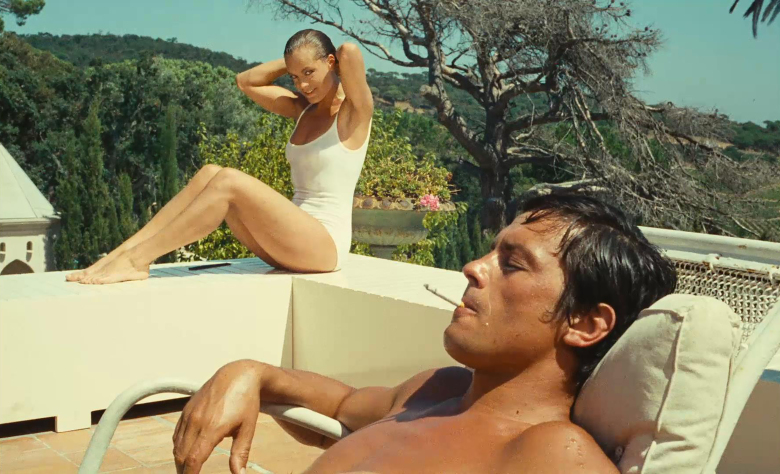A seemingly happy couple is living in a borrowed villa near St. Tropez—smoking cigarettes, making love, and languidly paddling around the deep topaz-blue swimming pool of the title. It’s a sun-drenched idyll until another man, ostensibly an old friend of them both, shows up with his beautiful 18-year-old daughter. Slowly, almost imperceptibly at first, old resentments come back. Cracks form in the couple’s relationship. Grudges become hostility, and finally erupt into violence.
It’s a simple, perhaps even cliched premise for a suspense film. But Jacques Deray’s 1969 “La Piscine” (playing New York’s Film Forum in a new 4K restoration starting May 14th, and released on Blu-ray and DVD by Criterion in July) has the impossibly beautiful Romy Schneider and Alain Delon as the couple, Marianne and Jean-Paul. When old friend Harry (Maurice Ronet) and his daughter Penelope (Jane Birkin) show up, the sex-appeal quotient heads for the stratosphere, and that’s not even including Harry’s new Maserati (“the monster,” as Marianne admiringly dubs it.) So for long stretches of the first hour, it’s more than enough simply to observe the cast from this angle and that—water beading over tanned skin, eyes reflecting various stages of torpor and lust, perfect limbs arrowing through the water, strolling around the edge of the pool, or stretching out on a lounge.

With the audience surely entranced by the visuals, the cryptic cleverness of Jean-Claude Carriere’s script may not register at first. The plot inches forward as information about this four-sided relationship is parceled out in non sequiturs, passive-aggressive observations, and backhanded compliments. Told that Harry has telephoned, Jean-Paul growls “Any time we hide some place, he’s the first to call.” Marianne invites Harry and Pen to stay a few days—and turns a feline half-smile at a clearly glowering Jean-Paul. As Harry shares an uncomfortable breakfast with Jean-Paul, he asks casually, “Sure you’re not keeping her from working?” Thus do we learn that Marianne is a writer; we also learn that Harry knows Jean-Paul is also a writer, and hasn’t been writing—because he can’t make a living at it. After an impromptu midnight party that finds everyone flirting dangerously with the wrong partner, Marianne presses Jean-Paul to say what he thinks of Harry’s daughter. He responds, “She’s strange.” And Marianne reads him like a book: “If I get you, I should pack my bags and leave.”
In addition to the swirling entanglements on screen, even all these years later the real-life histories and off-screen ironies enrich “La Piscine”. Schneider and Delon had once been the It Couple of the European film scene, becoming engaged a year after they met on the set of 1958’s “Christine,” but somehow never marrying. Delon had broken things off in 1964 with a note that became legend: “Gone to Mexico with Nathalie.” He’d married Nathalie, and Schneider had since married another man.
But though Jacques Deray suggested Monica Vitti, Delon insisted on Schneider. It was a brilliant instinct; the movie proves their on-screen chemistry had grown exponentially in the years apart. The film was also a breakthrough role for Schneider. Enigmatic, stunningly beautiful and thoroughly adult, the character of Marianne was a world away from the “Sissi” films of the 1950s, where a very young Schneider had made her name playing the innocent young Empress Elisabeth of Austria.
Jane Birkin was actually 22 during filming, but her half-awkward half-cool manner was perfect for Pen. She had just recorded the notorious “Je t’aime (moi non plus)” with her lover, the 41-year-old French singer-composer Serge Gainsbourg, who pursued young women and wrote lurid songs about even younger ones. Birkin’s offscreen life adds a twist of wry amusement to the moment when, in a burst of honesty rare for these characters, Pen tells Jean-Paul that if people think she’s Harry’s girlfriend, “he likes it best, though he protests, ‘No, no, she’s my daughter!’ hoping they won’t believe him.”
Alain Delon and Maurice Ronet had worked together previously on a key career film for them both: 1960’s “Plein Soleil” (aka “Purple Noon”), director René Clément’s adaptation of Patricia Highsmith’s celebrated novel The Talented Mr. Ripley. Ronet had played Philippe Greenleaf. Like Harry, Philippe is wealthy and self-indulgent; also like Harry, Philippe underestimates the resentment he inspires in a supposed friend; that friend is Tom Ripley, played by Delon of course. Delon’s handsomeness was so extreme that he barely had to do anything to strike an audience as untrustworthy. A face that perfect, one reasons, could be concealing anything.
And real life seemed to bear that notion out. Just the year before, even as “La Piscine” was ending filming, the corpse of Delon’s bodyguard, Stevan Markovic, had been discovered in a public dump. The ensuing scandal grew to include a supposed stash of illicit nude photos, a Mob-tied friend of Delon’s named Francois Marcantoni, and Georges Pompidou, then the prime minister and later the president of France. The murder remains unsolved to this day.
Even if you weren’t reading the newspapers in 1969, it’s plain early on that the real trouble is going to come from the direction of Delon, and not Harry, played by Ronet as someone whose flashy lifestyle, see-through shirts and Italian car all scream mid-life crisis. The climax of the film is shocking not due to violence, but for how long it lasts and how cold-bloodedly it’s executed. The last half-hour, with its matter-of-fact French police inspector and rapid triple-twist denouement, doesn’t seem to fit with the first ninety minutes at all.
But perhaps that disjointed fadeout is only right for “La Piscine”; as Marianne says, “I don’t like summer. Only the in-between seasons.” The miniskirts (via designer André Courrèges), the jazz-pop Michel Legrand score, and the legendary cast couldn’t be more late-‘60s if you conjured them via a seance. But the movie’s libertine atmosphere, the characters’ self-absorption, the sense of ideals abandoned if they ever existed at all—all show Deray and Carriere pointing directly ahead to the 1970s. In the world of “La Piscine,” it’s already the Me Decade.











